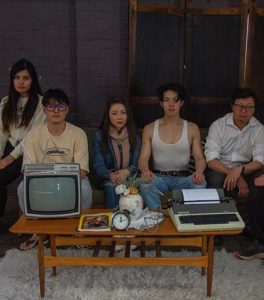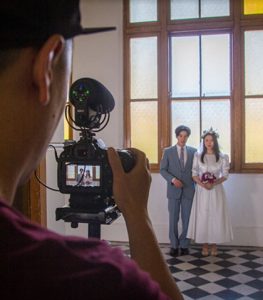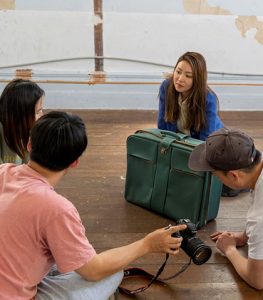Short films carry deep messages on family violence
A new creative initiative to build awareness of the need the combat domestic and family violence in Australia’s Korean community has recently launched.
‘The Ari Project’ is a creative rendering of messages around preventing violence against women in the context of a diaspora community in Australia.
 It centres on the character of Ari, a Korean victim-survivor, and her lived experiences of domestic and family violence (DFV) while highlighting her resilience, capacity and agency.
It centres on the character of Ari, a Korean victim-survivor, and her lived experiences of domestic and family violence (DFV) while highlighting her resilience, capacity and agency.
The messages are delivered through the mediums of animation, music video and storytelling. The project is latest spin-off of a long-running program established by migrant and settlement agency AMES Australia to build awareness and capacity in diverse communities about the Prevention of Violence Against Women (PVAW).
The work of domestic family violence researcher and Korean migrant Hyein (Ellen) Cho’s was the original inspiration for the project.
She teamed up with filmmaker and composer Jun Bin, whom she met through AMES Australia PVAW Leadership Course. Jun is a Malaysian Chinese who shares the goal of raising awareness about domestic and family violence within Asian-Australian communities.
Jun Bin and Ellen collaborated with dance facilitator Sarah Yu and a team of diverse local Asian-Australian talents in Melbourne to transform the narrative of ‘Ari’ into the three-part short film series to highlight lived experience of DFV in Australia.
Ellen said the aim of the project was not just to call out family violence but also to highlight the resilience and strength of victim/survivors.
 “We wanted Ari’s voice heard in the wider community. Usually academic reports are not accessible to most people, so we were not quite sure how to do that,” said Ellen, who is a research fellow at Monash University’s Gender and Family Violence Prevention Centre.
“We wanted Ari’s voice heard in the wider community. Usually academic reports are not accessible to most people, so we were not quite sure how to do that,” said Ellen, who is a research fellow at Monash University’s Gender and Family Violence Prevention Centre.
“I connected with Jun and we came up with the idea of doing something creative in an Asian Australia context. And then we applied for funding from Creative Victoria and the Freilich Project, ANU,” she said.
Jun said that Ellen’s research provided the stories that filled out ‘Ari’s’ story.
“Sarah then helped me to tell the story in a creative way,” he said.
The project draws on popular Asian genres of animation and K-Pop style music videos to engage the Korean community in an accessible way.
“That was deliberate. K-Pop is a pervasive cultural thing now and we wanted to use that to cut through to people,” Jun said.
“We wanted to address the problem entertainingly as we as resourcefully,” he said.
Sarah said it was important the stories were deeply human and empathetic.
“The three stories tell Ari’s story of healing and freedom and internalises her falls, her triumphs and her barriers. We tried to put people in her shoes,” she said.
“We wanted to portray the story in a deep sense. We wanted to push the boundaries and provoke thought.
“We didn’t see the subject of DFV as a Korean specific issue. It’s an issue that can happen in any community,” Sarah said.
She said the project had given insights into her own family’s experience.
 “I learned a lot about my own family, who originally came from Hong Kong. There is a sense of stigma in Asian communities about these issues and feeling that they don’t really exist or are seen as a weakness,” Sarah said.
“I learned a lot about my own family, who originally came from Hong Kong. There is a sense of stigma in Asian communities about these issues and feeling that they don’t really exist or are seen as a weakness,” Sarah said.
“But it’s been fascinating to analyse the behaviour of my own family. It’s helped me better understand who I am and who my family were,” she said.
Ellen said that an important message conveyed in the project was Ari’s “agency, capacity and resilience”.
“Ari was the main provider in the family and she was also raising children. We hope this goes some way to breaking down the stereotypes of Asian migrant women,” Ellen said.
She said that ultimately, the aim of the project was to shed new light on the little-recognised issues of DFV within the Korean diasporic communities.
“We wanted to make the digital resources available to the public for free to be used as training and educational materials,” Ellen said.
“And we want to continue with this. We are using the arts to convey these messages but we also want to emphasise the importance of cross-sector collaboration on this issue,” she said.
See more about The Ari Project here: theariproject.com












